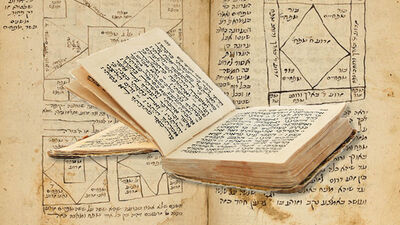Cardozo on the Parashah: Essays on the Weekly Torah Portion
Bereshit - The Book of Genesis
Gepubliceerd op: 3 september 2020
Bereshit - The Book of Genesis
St. Paul, Minnesota: Kasva Press, 2020
Aantal blz.: 274
ISBN: 9781948403108
The art of biblical interpretation is more than just knowing how to understand the deeper meaning of the words and expressions. It is impossible to treat the biblical text as one would any other classical work, because the people of Israel, according to Jewish tradition, are not the authors of this text; the text is the author of the people. Truly learning Torah requires human authenticity. It means standing in front of a mirror and asking yourself the daunting question who you really are.
This collection of essays by a rabbi known internationally as "one of the most thoughtful voices in contemporary Judaism" looks at the weekly Torah portion through the eyes of philosophy, contemporary controversies, and personal struggles. Written in Rabbi Cardozo's characteristic style, this collection offers something for many different types of readers: laymen and clergy, full-time students and intellectually curious practitioners, Jews and non-Jews alike.
This publication was made possible with the support of the Louis and Dina van de Kamp Foundation, given in August 2020.
Rabbijn dr. Nathan Lopes Cardozo (1946) werd geboren in Amsterdam en woont sinds 1977 in Israël. Als kind van een Portugees-Joodse vader en een niet-Joodse moeder heeft hij een lange weg afgelegd. Op zijn zestiende is hij ‘uitgekomen’ (Joods geworden) bij chacham Salomon Rodrigues Pereira. Jaren later haalde hij zijn rabbijnentitel aan de orthodoxe Gateshead Yeshiva. In Jeruzalem richtte hij de David Cardozo Academy op en hij geeft lezingen in Israël en het buitenland voor Joden en niet-Joden. Hij is de auteur van vijftien boeken. Rabbijn Lopes Cardozo neemt in zijn geschriften geen blad voor de mond en zijn ideeën worden in velerlei media fel bediscussieerd. Zijn meest recente twee boeken zijn Jewish Law as Rebellion. A Plea for Religious Authenticity and Halachic Courage (Urim Publications, 2018) en Cardozo on the Parashah : Essays on the Weekly Torah Portion. Bereshit -The Book of Genesis (Kasva Press, 2019).
Book review: Cardozo on the Parashah: Bereshit
by Shmuel Phillips
August, 27, 2020: The Jerusalem Post
From robotic practice to meaning
The opening passages of the book remove whatever lingering doubts the reader might have clung to that the book is in any way comparable to the run-of-the-mill parasha-based Torah commentaries.
Biblical prophets, with their frequent forecasts of doom and well-founded fault-finding, faced a considerable challenge: how to catch the ears and hold the attention of their audiences for long enough to deliver their unwelcome finger-wagging. They certainly rose to this challenge, raising numerous eyebrows along the way, too. From Hosea’s communion with a prostitute – a vivid depiction of Israel’s rampant idolatrous infidelity to God – to Ezekiel eating cow dung in his portrayal of the imminent siege of Jerusalem, and Isaiah walking naked and barefoot for three years, prophetic antics and intrigue would have kept the tabloid headline-writers of the ancient world on their toes.
Alas, Rabbi Nathan Lopes Cardozo received no divine imprimatur to perform stunts of this ilk. But the flamboyant philosopher-rabbi, famed for his wish to renounce the “dull observance" of kippah-wearing and even shut down the "tragically divisive” Kotel, does his best to implement their literary equivalent. Cardozo on the Parashah: Bereishit opens with an astounding Foreword from no less than God Himself, who disclaims responsibility for some of the “outrageous ideas” that have been advanced in His name by many of His most devoted followers. Fortunately for the author, God – against His better judgment – is willing begrudgingly to grant permission for this book.
The opening passages of the book remove whatever lingering doubts the reader might have clung to that the volume grasped in his hands is in any way comparable to the run-of-the-mill parasha-based Torah commentaries. In the opening words of the first chapter, “The Unavoidable and Disturbing Text”, we are informed that “Torah study has become almost impossible” – not because of any problem in the text, but because we as a people have lost touch with the Torah’s soul. Cardozo confronts us with a biting critique of the detachment of our religious lives from the Torah’s spirit. We “elevated religion to such a level that its influence on everyday life has been lost…. But the intention of the Torah is exactly the reverse. Its words, events and commandments are placed in the midst of the people….”
Further condemnations of contemporary religious attitudes quickly follow. Echoing the persistent denouncements of biblical prophets, Cardozo finds us guilty of performing commandments robotically, heedless of the moral and spiritual messages that they are intended to convey and embody. Even core religious activities such as prayer are performed by rote, reduced to pomp and ceremony while denuded of their intended religious meaning. We are taught how Judaism is supposed to be an ongoing challenge and encounter with God, a religion that demands a constant search for increased meaning rather than habitual unthinking obedience. The body of Halacha itself is labeled an escape route that allows its devotees to substitute obsessive fascination with its minutiae for a proper grasp of Jewish theology and, most importantly, a profound and meaningful relationship with God.
Just a few chapters in, one can imagine some traditional readers wishing to condemn the author to a similar fate to that of his prophetic predecessor Jeremiah, who was cast into a prison mud-pit for challenging the corrupt and complacent religious establishment of his day.
A personal highlight for me is a profound essay on the deep religious significance of circumcision. Addressing the moral concerns of those who protest the religious command to inflict harm on an innocent, non-consenting baby, Cardozo launches into a superb analysis of the conflict between the Jewish worldview’s focus on duty and the contemporary Western worship of rights.
Other chapters weigh in on heavy theological subjects such as theodicy, free will and determination, and the irresolvable conflict between God’s apparently unknowable Essence and biblically described Personality. In the midst of all this, Cardozo manages to integrate – and often attempts to rehabilitate – a number of less-than-traditional historical Jewish personalities such as Spinoza and Freud.
The author’s emphatic insistence that the true spirit of Judaism requires one to stand up and challenge authority – including the biblical texts and even God himself – may embolden readers to turn the tables and question some of the radical ideas presented in his book, too. In particular, more “traditionally Orthodox" readers might find themselves protesting the extent to which it is proposed that Halacha be “restrained” by loosely defined and ultimately subjectively determined moral imperatives.
Readers well grounded in Jewish tradition may also feel a distinct unease at the way in which the overwhelming rabbinic understanding, prayer liturgy and even the biblical text itself is swept aside in order to facilitate Cardozo’s conclusion that Abraham actually failed the test of the binding of Isaac (though the question is raised, unanswered, in the “Points to Ponder” at that chapter’s conclusion).
To dwell too long on the more radical conclusions offered in this book, however, risks missing its point entirely. After all, the author has already warned us in its preface that he would be “insulted” and “ashamed” if he always agreed with his own writings. Rather, the prevailing value of this volume is its potential to jolt the reader from a religious somnambulism that idealizes robotic routine over spiritual search for meaning, empty ritual over an attempted relationship with God.
Ultimately, this book’s success should be judged by its ability to reach, challenge and inspire the sorts of people who would typically seek out the safe shelter of a reassuring and unchallenging parasha book.
Shmuel Phillips is the author of Judaism Reclaimed: Philosophy and Theology in the Torah.




